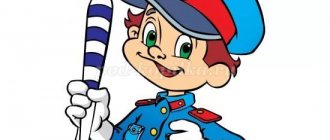MAGAZINE Preschooler.RF
Protocol of the parent meeting in the middle group “Travel according to the age characteristics of children 4-5 years old”Winner of the all-Russian competition “The most popular article of the month” NOVEMBER 2017
Conditions of the competition:
From September 20, 2022
Goal: To acquaint parents with the age characteristics of children in the middle group, the tasks of education and training for the school year
Event plan
- Introductory part. To acquaint parents with the age characteristics of children 4–5 years old and the characteristics of the educational process.
- Regular moments in kindergarten
- Filling out information about children and parents.
- Solving group issues.
Progress of the parent meeting
1. Speech by the teacher of group No. 2 “Kapitoshka” O.A. Malyutina.
Good evening, dear parents! Today we will talk about how our children have changed and what is typical for their age.
The ages of four to five years are the middle preschool period. It is a very important stage in a child's life. This is a period of intensive development and growth of the child’s body. At this stage, the child’s character changes significantly, and cognitive and communication abilities are actively improved. Therefore, at this age, the role of the family in the upbringing and development of the child is very important.
Family is the most important. According to practicing child psychologists, the family plays a vital role in the development of a child’s personality. The relationship between parents is the first thing a growing child sees; this is the standard that he considers the only true one. Therefore, it is very important that the child has a worthy example in the person of adults. Parents should remember that it is in preschool age that character traits such as kindness, justice, truthfulness develop, and life values and ideals are laid. Relationships within the family are the most important factor influencing the upbringing of a child and his entire subsequent life.
Education: When talking about raising children of this age, you need to remember that at this stage the character changes significantly. The crisis of three years passes safely, and the child becomes much more obedient and flexible than before. It is at this time that children need full communication with their parents. The main function of adults now is to explain in as much detail as possible and show by personal example. The child absorbs everything like a sponge, reaching out to new knowledge with the curiosity of a discoverer. Parents must listen carefully to numerous questions and answer them, because in the family children gain their first knowledge about the world around them and their place in it. It is now that it is necessary to lay down moral qualities, to develop kindness, politeness, responsiveness, responsibility, and love of work in a child. At this stage, the child makes his first friends, so it is very important to teach how to communicate with peers: to give in, to defend one’s interests, to share.
- Physical capabilities: see slide No. 6
- Mental development: see slide number 6
- Role of the game: see see slide number 7
- Creative abilities see slide number 7
- Speech development: see slide number 8
- Emotional characteristics, see slide No. 9
By the end of the school year, a 5-year-old child should be able to
- Fine motor skills, see slide number 11
- Thinking see slide number 12
- Mathematics see slide number 13
- The world around us, see see slide No. 14
- Memory see slide No. 15
- Speech development, see slide No. 16
MAIN TASKS OF WORK FOR THE 2017-2018 SCHOOL YEAR:
- Promoting children's health
- Fostering the need for a healthy lifestyle
- Creating conditions for realizing the need for physical activity in everyday life
Priority direction of kindergarten
- Ecological-biological
- Physical education and health
Group direction
- The use of didactic games to form elementary mathematical concepts for the cognitive development of preschool children
I would also like to introduce you to the GCD grid and regime moments. (Appendix 1, 2) GCD is held from Monday to Friday. The lesson time increased to 5 minutes compared to the 2nd younger group. In the middle group, 20 minutes are allotted for classes. Breaks between classes are from 10 to 15 minutes. There are 2 classes per day.
- Lesson schedule, see slide No. 18
- Daily routine, see slide No. 19
- Clothing in a group and on the street
- Clothes for the pool
- Vkontakte community
- Participation of children in competitions
2. Selection of the parent committee.
At the meeting it was decided to leave the parent committee with the same composition. By voting all parents.
3. Filling out information about children and parents.
- powers of attorney from parents for other persons picking up children from kindergarten
- consent to photo and video shooting of children
- consent to hardening measures
4. Solving group issues.
| Next > |
Middle group. Junior preschool age. Children 4 - 5 years old
Minutes of the parent meeting of the middle group “Beginning of the school year” Minutes of the parent meeting No. 1 09/14/21 of the middle group Topic: “Beginning of the school year”
.
Present: 15 people. Secretary: Chairman: Goals: Expanding contact between teachers and parents .
Objectives: Modeling prospects for interaction for the new academic year; increase... Minutes of the parent meeting of the middle group MINUTES No. 3 . Meeting of the parent meeting of secondary group No. 7 on the topic: “Health-saving technologies in Dow” Meeting : 1. Speech by the teacher of the secondary group I.V. “The health of our children is in our hands”
. 2. Speech by teacher-psychologist V.A. 3.Rules...
Preview:
Municipal preschool educational budgetary institution
kindergarten No. 38
Municipal formation Korenovsky district
parent meetings in middle group "A"
for 2016 - 2022 academic year
Municipal preschool educational budgetary institution
kindergarten No. 38
Municipal formation Korenovsky district
parent meeting of secondary group No. 6 “Brusnichka” dated September 7, 2016.
Chairman: Sidorova K.V. - parent
Secretary: Manyuk E.A. - parent
There were 14 people present, the list is attached.
Topic: “Features of the educational process in the middle group”
1. Slideshow: “How we spent the summer.”
2. Preparation of information sheets: memos “Age characteristics of children in the fifth year of life”, schedule of activities, daily routine, rules for parents.
3. Development of a draft decision of the parent meeting.
I. Consultation on the topic: “Features of the educational process in the middle group.” Speaker: Ovdienko L.A.
II. Prevention of ARVI and influenza vaccination. Speech by teacher Ovdienko L.A.
III. Selection of the parent committee.
IV. The slide show “How We Spent the Summer” was prepared by L.A. Ovdienko.
I. On the first question: the teacher of the middle group Ovdienko L.A. spoke. She drew the attention of parents to the fact that the age from four to five years is a period of relative calm. The child came out of the crisis and generally became calmer, more obedient, and more flexible. The need for friends becomes more and more powerful, and interest in the world around us increases sharply.
She brought to the attention of parents that at this age the child actively manifests:
• Striving for independence. It is important for a child to do a lot on his own; he is now more able to take care of himself and needs less adult care. The other side of independence is a statement of one’s rights, needs, attempts to establish one’s own rules in the world around one.
• Ethical ideas. The child expands the palette of conscious emotions, he begins to understand the feelings of other people and empathize. At this age, basic ethical concepts begin to form, perceived by the child not through what adults tell him, but based on how they act.
• Creative skills. The development of imagination is entering a very active phase. A child lives in a world of fairy tales and fantasies; he is able to create entire worlds on paper or in his head. In dreams and various fantasies, the child gets the opportunity to become the main character, to achieve the recognition he lacks.
• Fears as a consequence of developed imagination. The child feels insufficiently protected in front of the big world. He uses his magical thinking to gain a sense of security. But the uncontrollability of fantasies can give rise to a wide variety of fears.
• Relationships with peers. The child develops a great interest in peers, and he increasingly moves from intrafamily relationships to broader relationships with the world. The joint game becomes more complex, it has a variety of plot and role-playing content (games to the hospital, to the store, to the war, acting out favorite fairy tales). Children are friends, quarrel, make peace, get offended, are jealous, and help each other. Communication with peers occupies an increasingly important place in a child’s life, and the need for recognition and respect from peers becomes more and more pronounced.
• Active curiosity, which causes children to constantly ask questions about everything they see. They are ready to talk all the time, discuss various issues. But their volition is not yet sufficiently developed, that is, the ability to engage in something that is not interesting to them, and therefore their cognitive interest is best quenched in an exciting conversation or an entertaining game.
Parents need to know what a child between the ages of 4 and 5 should be able to do and know.
Kidanova Alla Nikolaevna asked the question “What are the most favorable conditions for the development of a child aged 4 to 5 years?”
Take into account the information from the speech of the secondary group teacher L.A. Ovdienko and her recommendations.
Place information about the age characteristics of children in the fifth year of life in the parent's corner.
If necessary, seek help from a teacher.
II. Teacher L.A. Ovdienko spoke on the second issue. with the message “Prevention of acute respiratory viral infections and influenza vaccination.” Lyubov Alekseevna told her parents that it was during this period that children’s immunity was most weakened and needed the most protection. She brought to their attention information about all the preventive measures carried out in the kindergarten, as well as the need to continue them at home. The teacher noted that health activities are carried out under the supervision of the kindergarten’s medical staff. Lyubov Alekseevna spoke about the need for the “Grippol +” vaccination, about its protection of the child’s body in the autumn-winter period, and also named contraindications under which it should not be done. Next, Lyubov Alekseevna answered the parents' questions. They were concerned about issues of nutrition and hardening, the dependence of the duration of the walk on the air temperature, clothing in the group and during the walk, etc.


